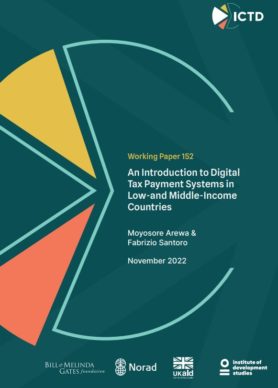Working Paper 152
National tax administrations are increasingly investing in the digital facilities needed to make it possible for taxpayers to go online both to file their routine tax returns (e-filing) and remit the tax payments due (e-payment). These facilities potentially benefit both taxpayers and tax administrations. This paper first maps the landscape, explaining which filing and payment technologies are used for tax collection in Africa. We then examine why these technologies are not used to their full potential. Some constraints are on the demand side. These include taxpayers’ preferences for cash and in-person relations and low familiarity with and trust in digital technology. Other constraints lie in infrastructure deficits and broader political, regulatory, and institutional factors. Unlocking the full potential of e-filing and e-payment systems thus seems to depend on meeting several pre-conditions, including solid political will, sound regulatory frameworks, reliable payment infrastructure and adequate investment in human capital. However, there is relatively little reliable evidence of the actual effectiveness of e-services in tax collection. We conclude by outlining some research priorities.
